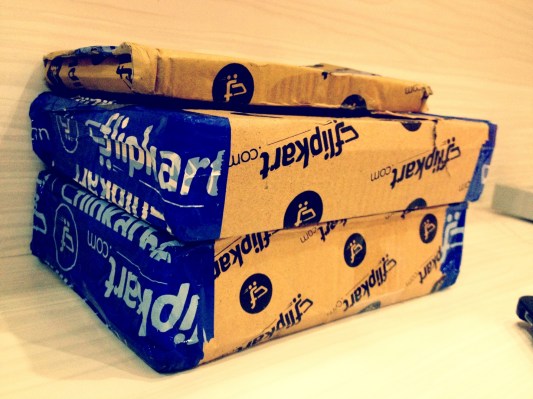Following months of rumors, Indian e-commerce giant Flipkart has confirmed that it has raised $1.4 billion in new funding at a post-money valuation of $11.6 billion to battle Amazon and Alibaba. The deal includes some big-name strategic investors: China’s Tencent, eBay and Microsoft, which join existing Flipkart backers that include Tiger Global, Naspers, Accel and DST Global.
The investment will also see Flipkart take control of eBay India, a second-tier e-commerce player in India, which will remain an independent e-commerce site. Separately eBay, which is a minor investor in Flipkart rival Snapdeal, has inked an international deal with Flipkart to cross-promote products between the services. That’ll give eBay sellers a chance to reach consumers in India, and Flipkart sellers the opportunity to expand their sales overseas, too.
Flipkart has now raised $4.65 billion from investors to date, according to Crunchbase. Its most recent round prior to today was $700 million in July 2015, which valued the company at a much higher $15 billion. While that’s a significant down round, which many had been predicting, this investment is the single largest round of financing from an India tech startup.
But, regardless, times have changed at the company. Flipkart shuffled its leadership in January when former Tiger Global executive Kalyan Krishnamurthy became its CEO, and it has been hard to keep up with the sheer volume of rumors coming out since then.
Last month, Flipkart was reported to have raised $1 billion from investors, with plans for a further billion to come later. It also has been linked with a merger deal with rival Snapdeal, a move media claim is motivated by Snapdeal investor SoftBank, in a bid to bolster its competitive edge against Amazon, while giving Snapdeal a springboard to bounce back from a series of struggles that have included 500-plus layoffs in February.
While the status and likelihood of other deals is unclear, today’s announcement gives Flipkart a series of very strategic allies to battle Amazon and Alibaba-backed Paytm, and “drive the next phase of e-commerce growth in India,” to use the company’s own words.
I recently wrote that India’s e-commerce space has increasingly looked like a battle between Amazon, which has invested more than $5 billion in its local operations, and Alibaba, which has made a series of investments in Paytm’s commerce, payments and nascent banking businesses, and now Flipkart has the war chest and supporters to get itself firmly back into the battle.
At stake is one of the world’s fastest growing internet markets. India’s online population is tipped to reach 450 million-465 million people by June 2017, according to a new report co-authored by the Internet and Mobile Association of India, widening the audience of potential e-commerce customers. While China and the U.S. currently dominate in terms of e-commerce spending, the value of online sales in India is predicted to reach $48 billion by 2020, analyst firm Forrester claimed.
“This is a landmark deal for Flipkart and for India as it endorses our tech prowess, our innovative mindset and the potential we have to disrupt traditional markets. It is a resounding acknowledgement that the homegrown tech ecosystem is indeed thriving and succeeding in solving genuine problems in people’s daily lives across all of India,” Flipkart founders Sachin Bansal and Binny Bansal said in a statement.
On the investor side, a few items are noteworthy.
Ebay was an early investor in Snapdeal, but sold off part of its stake back in 2015. Now it finds itself on another team’s bench, although that could change if the much-speculated Flipkart-Snapdeal merger deal is completed.
This investment is Microsoft’s largest deal in India, and it comes just months after Flipkart switched its infrastructure to the U.S. company’s Azure cloud computing platform. Satya Nadella, Microsoft’s CEO, visited India around the time of the deal in February, so you’d imagine there were also talks around this investment.
Finally, the deal is also the largest investment in India for Tencent. Tencent has long been a prolific investor, but this deal completes three quite distinctive outcomes for its investment deal. It recently backed Tesla, buying up a five percent stake for around $2.2 billion, while Snap’s recent IPO gave it the first equity in a publicly listed U.S. company. Now it also has a major stake in India’s e-commerce war.
